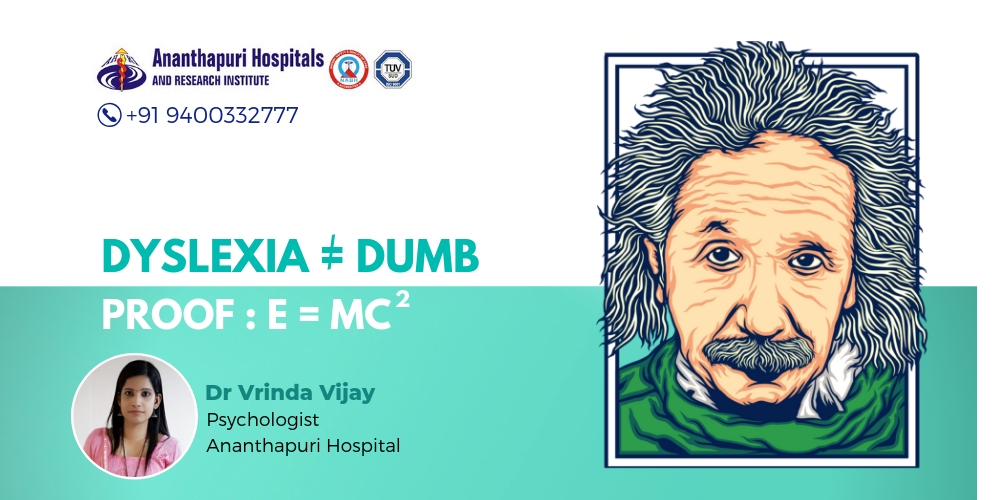- 25/March/2019

Dyslexia - A learning disability - Ananthapuri Hospital, Trivandrum
It was back in 2007 that 'Taare Zameen Par' got released. The story is that of a child with dyslexia who has a tormented life at school and at home, but after his artistic talents are discovered by his art teacher at the boarding school, he becomes a successful student. This movie pulled at Indian heartstrings and helped people understand the kind of difficulties people with dyslexia go through. Dyslexia may be one of the most well-known and yet least understood of all the learning disorders. That is why we have Dr Vrinda Vijay, a reputed psychologist working at Ananthapuri Hospital, who can shed some light on this condition.
WHAT IS DYSLEXIA?
Dyslexia is a specific learning difficulty that causes problems with reading, writing and spelling, but unlike learning disability, the intelligence is not affected. Dyslexia affects areas of the brain that process language. People with dyslexia have difficulty reading due to problems identifying speech sounds and relating them to letters and words (decoding).
DO KIDS WITH DYSLEXIA WRITE LETTERS JUMBLED AND BACKWARDS?
Unfortunately, this is an age-old myth. Young kids, regardless of whether or not they have dyslexia, tend to write letters in reverse during the learning phase. In fact, only a small population of people with dyslexia write like that. So do not take that as a definite sign of dyslexia.
CAN A PERSON WITH DYSLEXIA BE SMART?
Dyslexia occurs in people of any intelligence level - average, above average and highly gifted. There are many gifted people at the top of their fields who are dyslexic, for example, Albert Einstein, Pablo Picasso, Leonardo DaVinci, and so on. While people with dyslexia are slow readers, they often are very fast and creative thinkers.
WHAT ARE THE SIGNS OF DYSLEXIA?
Signs of dyslexia can appear as early as preschool. If you doubt your child has dyslexia or you think you might have dyslexia yourself - here’s what you need to look out for. The signs of dyslexia at various stages of life are:
PRESCHOOL:
- Trouble learning common nursery rhymes
- Difficulty learning and remembering alphabets
- Mispronounces words that are familiar to the child
- Doesn’t recognize rhyming words like cat, mat, bat and so on
KINDERGARTEN:
- Reads in a way that there is no connection to the sounds of the letters
- Complains about how difficult reading is
- Unable to sound out simple words like cat, rat and so on
- Cannot associate letters with sounds
HIGH SCHOOL:
- Slow and awkward reading
- Cannot respond quickly, hence struggles when they’re required to respond quickly
- Pauses, hesitates and uses lots of “um” while speaking
- Not able to strategise how to read new words
- Unable to finish exams on time
- Poor spelling
- Low self-esteem (often thinks they’re dumb or is concerned that their friends think they’re dumb)
- Trouble remembering dates and names
- Messy handwriting
ADULTS:
- Reading skills would have developed but still requires great effort
- Oral language difficulties persist, lacks fluency
- General anxiety when speaking and struggles to retrieve words
- Can’t remember names and confuses names that sound alike
IS THERE A CURE FOR DYSLEXIA?
No, there is no cure for dyslexia. It is a lifelong condition. But with early screening, diagnosis, and with the help of reading interventions and most importantly - emotional support, dyslexic individuals can become highly successful students and adults.
For someone with dyslexia, the emotional side effects can be a significant issue. It can be difficult for them if they get labelled as ‘lazy’ or ‘stupid’ when in reality they’re working as hard as they can. This generally arises when that person is in a place where people have very little understanding of dyslexia.
So, if you’re a teacher or a parent and you recognise someone who has dyslexia - help them seek evaluation and instructional help with reading and writing, regardless of their age. Also, make sure they feel valued and loved. They may have strengths that you may not, he or she may be incredibly creative. They’re just as intelligent as you are. Their brain just works in a different way.
DYSLEXIA IS NOT A DISADVANTAGE!
There are specific educational approaches and techniques that can improve their abilities to read and write. The earlier the intervention begins, the better!
The Psychiatry and Behavioural Sciences wing of Ananthapuri Hospitals and Research Institute provide expert care comprehensive evaluations to assess to adults, teenagers and children who have learning disabilities as well as some of the rarest and most challenging conditions. To book an appointment, call us at +91 9400332777 or visit our hospital at Chacka, NH Bypass, Thiruvananthapuram.

